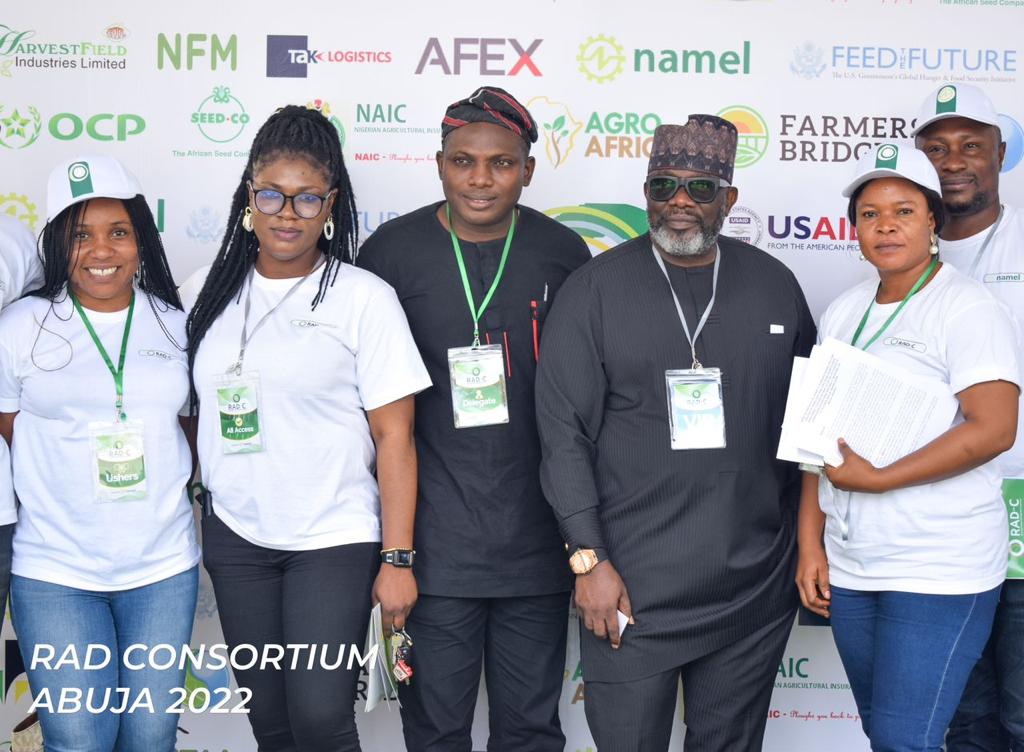AFDB, Nigeria govt, organised private sector endorse RAD-C iniative by NAMEL
4 min read
NAMEL
An African led and a major company in the transformation of the continent’s Agricultural sector, the Nigerian Agricultural Mechanisation & Equipment Leasing Company (NAMEL), has called for repositioning the system at the launching of a new innovative way of doing business in the industry with the launching of Rural Agricultural Development Consortium in Abuja.
While speaking at the launching, the CEO of NAMEL, Mr. Ahmed Adekunle told the delegates, ” Some of the Short-term goal of RAD-C is to develop 500,000 hectares of contiguous farmland across different states and create 1 million direct jobs and about 2 million indirect jobs for community youths and women.
”It will also produce 2.5 million Metric tons of premium crops annually including Rice, Maize, wheat, and cassava While also Alattracting an estimated 50Billion worth of investment directly to the rural communities.”
”RAD-C model provides a verifiable window for development partners and Government to implement Agricultural development initiatives such as the Staple Crops Processing Zones, AFDB Emergency Food Production Facility, Central Bank of Nigeria Accelerated Agricultural Production Scheme (etc).” He added
The African Bank for Development AfdB at the event represented by Dr Martin Fregene, Director Agriculture and Agro Industry, Africa Development Bank(AFDB) said the agricultural challenges in Africa was as a result of three Cs. They are particularly pleased with the launching and outlined three C which are important in agriculture. Namely, Covid-19, climatic change and crisis across the world. These three C’s affect agricultural production especially in Africa as seen. A war in Europe affected the continent where the best of weather conditions existed.
The African continent most seek deeply how it can Redesign and develop the agricultural sector. This is the main structural changes and reason why today’s event is very important.
Speaking on the Rural Agricultural Development Consortium, the executive director said, “Africa need new technologies to raise productivity and many factors are not favouring African agricultural sector such as pricing, food storage, lack of structured system and full implementation of actions. We need to look at the best solution in the effect and reliable in order for our weather and for our farmers to use the right seeds and having the right blend for the right production time”.
Speaking further at the launching, the Continental Bank, AfdB Director, added, “it is looking at supporting, higher productivity capacity, financing and structuring of Agriculture on the African continent.
“What RADC is modernising the sector providing a full implementable system to farmers and producers to help agriculture become competitive. We are very pleased to see that this is happening.
“NAMEL is trying to provide from inputs, bringing all the companies together at affordable, accessiblable, and bring mechanization, as productivity is tied to MECHANISATION.
NAMEL is also bringing storage together and infrastructure of the entire eco system under this project to ensure that African agriculture is growing and competitive. We are pleased and happy with the RADC been launched today. Is the very first step in the right direction. If successful, will use it as a template across Africa. We at AfdB cannot wait to receive the first application from NAMEL on the RADC to fund it and to make sure it becomes successful. As our President Adesina, believes Africa can be become successful sooner. We will provide full support as NAMEL is doing for rural farmers and please consider us as your full partners in this.” concluded the Bank’s Director.
The Nigeria’s Minister of State for Science, Technology and Innovation, Chief Henry Ikechukwu Ikoh, said that the utilisation of technology and innovation will enhance collaboration of the private sector’s capacity for achieving the desired agricultural development in the country.
“I am in support of RADC project to repositioning Nigeria’s agriculture development so that we can be able to compete favourably in the comity of nations.
“Under my ministry, we have interest in bringing in new innovation making sure that there is value added.
We have to changed the notion and system where by our products are taken out of the country only for another country to labelled them as theirs”, he added.
The ministry of Agriculture and Rural Development, (FMARD) represented by Engr John Drain, Deputy Director, Department of Engineering and Mechanisation added that, ”there is need to work together to address the challenges facing the agriculture sector such as climate change, use of mechanization, agric business and agric economy to succeed as a nation.”
Mr. Richard-Mark Mbaram, CEO of AgroNigeria, sees RADC as a global idea.
“It is a continental activity to facilitate and consolidate agricultural transformation for global impact and will feature prominently at this year’s Africa Agriculture Dialogue, taking place as part of the global Borlaug dialogue in Des Moines, Iowa.” he chipped.
Other contributors sees RADC as bringing that needed value to the system. Creating jobs and making our products noticed. We have to make sure some of the equipments, tractors are produced locally.
The Rural Agricultural Development Consortium (RAD-C), is a model that was developed in collaboration with significant and major agricultural institutions and organisations, such as AFEX, CBN (Central Bank of Nigeria), National Agricultural Insurance Corporation (NAIC), Harvest Field, OCP, NFM, SEEDCO, who are all established and emerging supply service providers, chain managers, agric specialists, agro-input marketers, farm managers, insurance specialists, among others.

